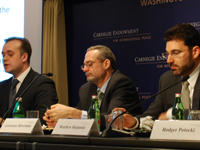Registration
You will receive an email confirming your registration.
IMGXYZ2971IMGZYXThe presidential election in Belarus in December 2010 was followed by clashes between police and protestors and a subsequent crackdown on the opposition by President Aleksandr Lukashenka’s government. The crackdown strained relations between Belarus and the European Union, which imposed asset freezes and visa bans on Lukashenka and more than 150 Belarusian government officials in January.
Alexei Pikulik from the Belarusian Institute for Strategic Studies, the National Endowment for Democracy’s Rodger Potocki, and Lawrence R. Silverman of the State Department discussed the latest developments in Belarus. Carnegie’s Matthew Rojansky moderated.
2010 Presidential Election
Pikulik described the context of the 2010 presidential election.
- Lukashenka’s Regime: Pikulik attributed the regime’s political survival to Lukashenka’s ability to create rents for the profit of his supporters. Major sources of rents include oil and gas, and exploiting contractual asymmetries with Russia, such as buying gas at a lower price from Russia, then selling it for more to other countries. Such rents may contribute as much as 30 percent of the country’s GDP, Pikulik estimated.
- Opposition: The opposition enjoys the support of Western donors, but only represents a small group domestically, Pikulik said. The opposition needs to work with the elite and their constituents to strengthen electoral support.
Election and Crackdown
The months leading up to the presidential election were characterized by a relatively relaxed atmosphere and a promise from authorities to avoid harsh measures against the opposition, particularly compared to the 2006 election.
- Opposition Parties: Andrei Sannikov’s European Belarus Party and Vladimir Neklyayev’s Say the Truth Party were among the most successful, Pikulik said. He suggested that understanding Neklyayev’s campaign, which was characterized by a lack of transparency about his financial support from foreign parties, is important to understanding the subsequent crackdown.
- Causes of Crackdown: Pikulik attributed the crackdown on the opposition to Lukashenka’s suspicions about Europe’s and Russia’s motivations for supporting the other parties, as well as his uncertainty about the role European countries played in supporting the opposition.
Aftermath
In the aftermath of the post-election crackdown, Belarus faces a geopolitical crisis, Pikulik said. Having alienated the European Union, Lukashenka can no longer strike a balance in the country’s relations with Russia and Europe, which may also lead to economic repercussions for Belarus. Moreover, by cracking down on the opposition, Lukashenka has risked alienating and radicalizing otherwise moderate constituents.
Moving forward
In the short term, U.S. and European actions toward Belarus will vary depending on what Washington and Brussels hope to accomplish, Pikulik explained.
- Releasing Political Prisoners: If the EU and United States want to secure a release of political prisoners, they must engage in talks with Lukashenka, raise the possibility of further economic sanctions, and offer positive incentives if Lukashenka agrees to release the prisoners, Pikulik said. This approach would have the unintended consequence of legitimizing Lukashenka’s rule, however.
- Replacing Lukashenka: If their goal is to replace Lukashenka, the West must do the following, Pikulik said:
- Support the opposition, while also working with intermediaries who can address the existing political power players
- Separate radical groups from opposition parties
- Revitalize the international dialogue on Belarus with Russia
Potocki added that reform from the inside, as opposed to regime change imposed from the outside, should be the West’s primary objective.
- Support the opposition, while also working with intermediaries who can address the existing political power players
- U.S.-EU Coordination: Silverman praised the level of U.S.-EU coordination on Belarus, calling the joint statements by Secretary of State Hillary Clinton and the EU’s Foreign Minister Lady Catherine Ashton “unprecedented.”
- Consistent U.S. Policy: Silverman denied the existence of a double standard in U.S. policy toward Belarus, saying that U.S. policy toward Belarus is no harsher than policy toward other countries. He added that the relationship between the two countries has remained consistent over time and is premised on values like democracy and the rule of law.
